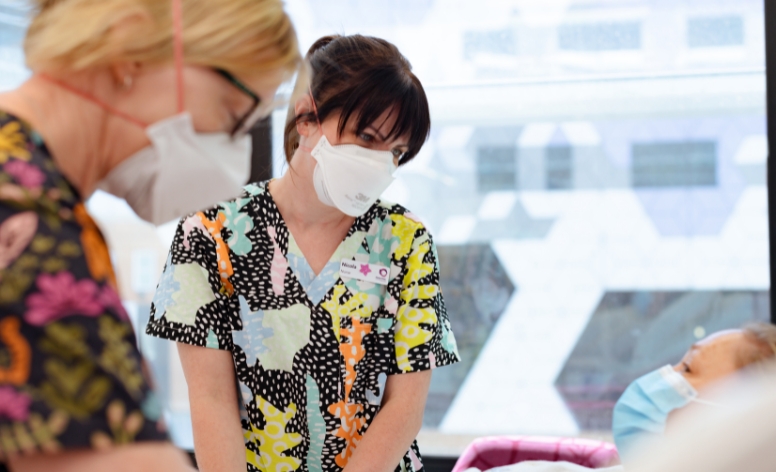
- Details
- Written by: Jessica Webster
- Category: News
- Hits: 1460

Researchers from Peter Mac have received grants valued at more than $6 million from the Medical Research Futures Fund to improve cancer care.
Peter Mac will lead two large collaborative studies, one utilising artificial intelligence to identify emerging infections in cancer patients and the other to create a digital platform to drive research in areas of need.
The Medical Research Future Funds aims to support a range of research to improve the health of Australians. Peter Mac researchers received more than six million in funding as part of the National Critical Research Infrastructure initiative designed to identify and fund world-class health and medical research.
Associate Professor Leon Worth, Medical Director Infection Prevention at Peter Mac will lead a project called “Applying artificial intelligence for surveillance of infections in cancer.”
“This project uses a next-generation digital platform termed EINSTEIN (Enhancing Infection Surveillance to Transform Excellence In National cancer care) and draws on a digital learning health framework and data science to detect serious and emerging infections in the immune compromised cancer population,” said Associate Professor Worth.
“People being treated for cancer are at a greater risk of infection due to their compromised immune system and often the infection is harder to treat for the same reason.
“The earlier we can detect and treat an infection the greater our chance of stopping it from becoming life threatening. With this platform we aim to develop a national scalable system standardising digital algorithms.
“The data will be incorporated into a clinical portal to accommodate everyday workflows in an electronic health record environment to assist clinical decision making around infection surveillance in the real world,” he said.
This project is led by Peter Mac in collaboration with the University of Queensland, Royal Melbourne Institute of Technology, BioGrid Australia Limited, Melbourne Health and Royal Melbourne Hospital.
Professor Karin Thursky also received a grant of close to three million dollars to lead a project called “Optimising real-world data use to drive cancer care delivery and research.”
The project involves a multidisciplinary team of clinicians, consumers, and researchers from health services, cancer cohorts, and digital health to establish a new research infrastructure.
“The National Cancer Cohort Platforms will be a significant Australian digital asset that will bring together several influential national cancer cohort studies into one location, including linkages to biospecimen repositories, and familial pedigrees,” said Professor Thursky.
The collaboration between KConFab, Australian Ovarian Cancer Study, Variants in Practice (ViP) Study, Lifepool, and Melanoma Research Victoria cancer cohort studies as well as BioGridD Australia, the Department of Health Services Research at Peter MacCallum Cancer Centre and the VCCC Alliance, is the first of its kind.
“This initiative will drive research by making these valuable clinical assets widely available to consumers, patients, clinicians and researchers in Australia and internationally, with a view toward their sustainability and interoperability.
“This approach provides a real opportunity to make progress in areas of unmet need in cancer, and to harness the power of big data, including the development of a platform that will meet our future needs,” she said.
Also collaborating on MRFF grants are Dr Stephen Wong who will assist in a project led by La Trobe University and Professor Michael Hofman and Associate Professor Grace Kong who will supply Pb-212 generators for a study led by AdvanCell.
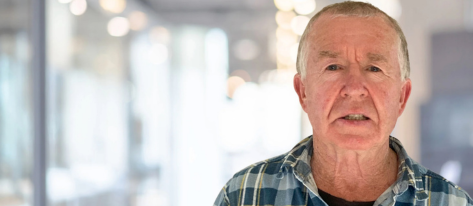
- Details
- Written by: Christopher Talbot
- Category: News
- Hits: 1545
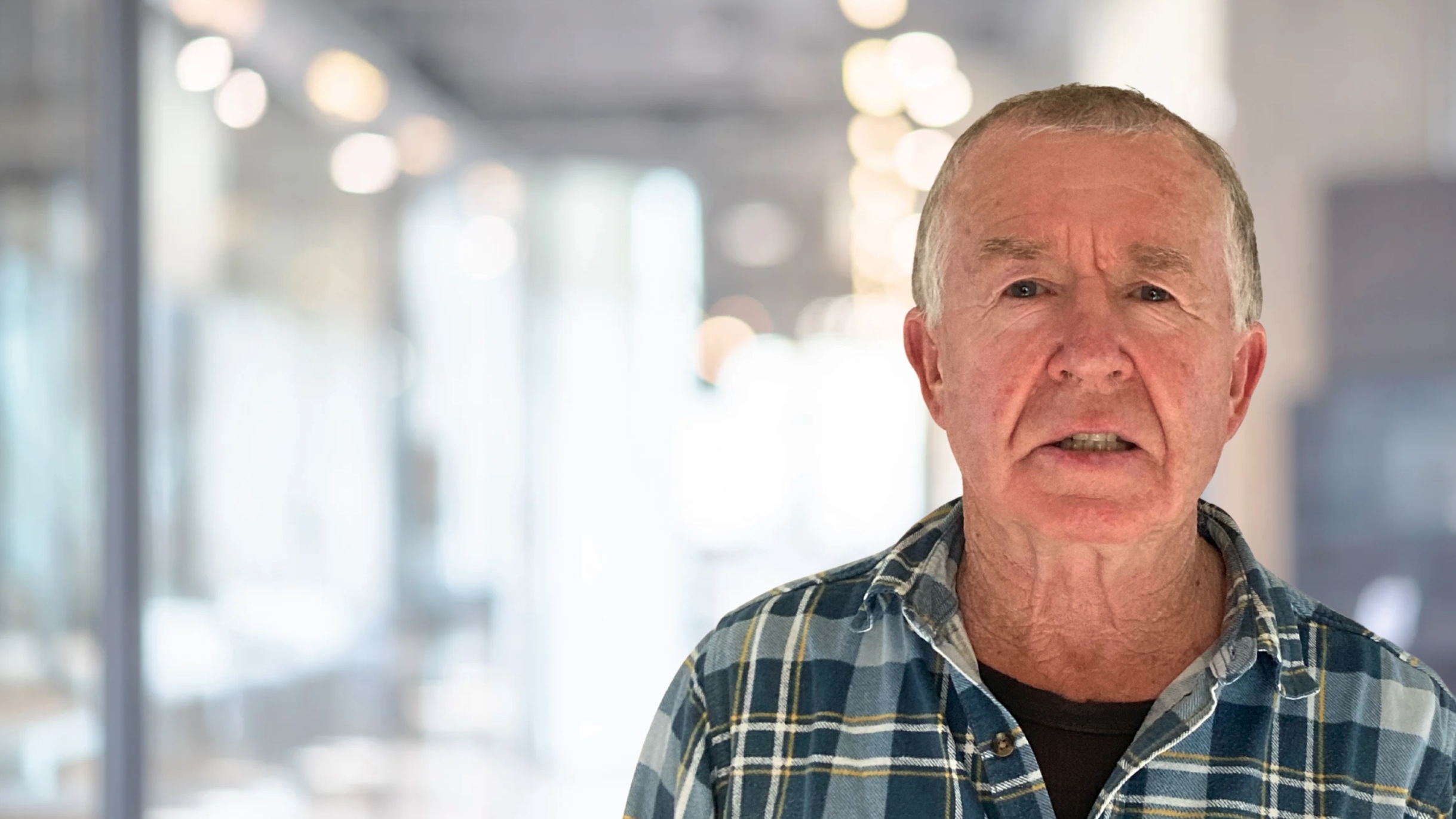
Sitting at home in Swan Hill in Victoria’s north, patient Darrell Hampton, 69, has nothing but a “red dot” on his head where a melanoma tumour used to be.
He was the first Australian patient to be treated for melanoma with electrochemotherapy - a procedure where chemotherapy is injected directly into the tumour followed by small electrical pulses delivered by a device that looks like a large pen.
These zaps temporarily open the cell membrane allowing the chemo to enter the cells, before the membrane closes off and the drugs get to work to kill the cancer.
For Darrell, this was an alternative to surgery which would have meant a complex reconstructive procedure and obvious scarring – and having already had surgery on the area, he was open to trying an alternative treatment after the melanoma returned.
“He’s doing brilliantly – he’s had a complete response to the treatment from this single dose,” Peter Mac’s Dr Hayden Snow, who undertook the procedure said.
“The tumour became blackened and died and that scab came off and the underlying skin has healed really well – we’re hopeful that the melanoma won’t return this time.”
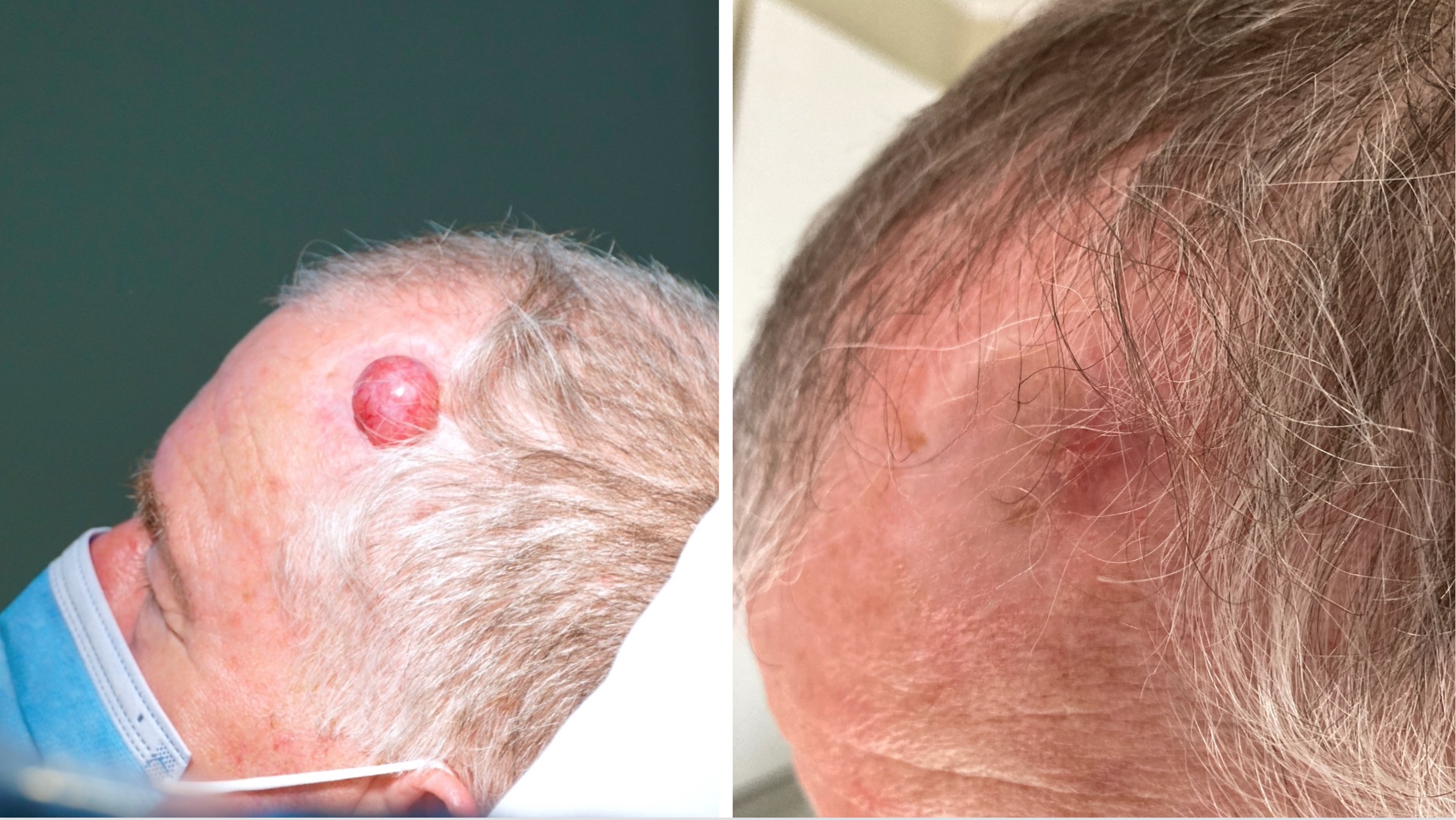
Darrell was in-and-out in a morning, the procedure taking just 20 minutes.
“There was nothing to it. No pain or anything, just some mild vibrations during the procedure and then I was off home later that day,” Darrell explains.
“Being the first Australian having this done was really good – but I don’t really care what the procedure is, as long as it works.”
“But it was great to have this option available and I think it really was preferable to surgery, all I have left behind is a tiny red dot.”
Dr Snow says that while the treatment won’t be suitable for every melanoma patient, it is another important tool in Australia’s arsenal against this common cancer.
“Darrell’s results really are everything we would have hoped for when we undertook the procedure a few months ago – the team is really excited about the potential of this treatment for suitable patients.”
“Less downtime and less scarring, it’s a win for patients who have a tumour like Darrell’s, delivering a great result with a less visible reminder of their cancer.”
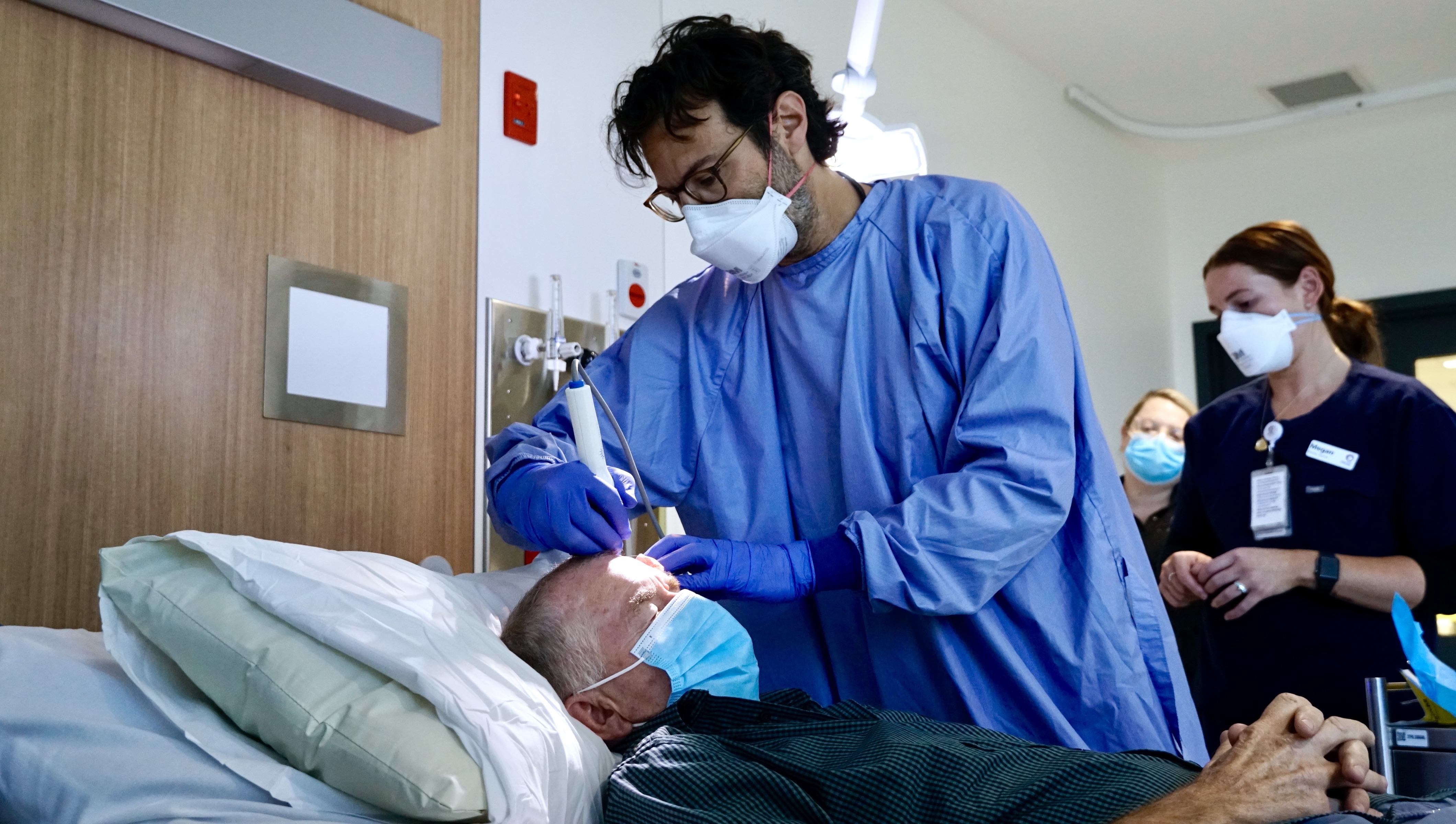
Darrell is due for follow up scans in a few months and will remain on ongoing monitoring.
There is fantastic potential for the use of electrochemotherapy in Australia, with other states now following Peter Mac’s lead and investigating this less invasive procedure.
The electroporation machine used in the procedure was funded by the Peter Mac Auxiliary.
The Auxiliary rely on an army of volunteer knitters and sewers from across Australia to stock their gift shop, with all sales directly supporting important projects across the centre.
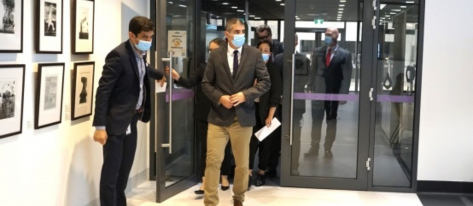
- Details
- Written by: David Walsh
- Category: News
- Hits: 643
Peter Mac is joining the Victorian Government, Monash Health and Monash University in a partnership with Israel’s Sheba Medical Center to boost digital health innovation.
Sheba is considered one of the world’s leading hospitals and the partnership will focus on the potential to establish an Accelerate, Redesign, Collaborate (ARC) Innovation Centre in Victoria.
Peter Mac CEO, Professor Shelley Dolan, said the establishment of an ARC Centre in Melbourne would help improve outcomes for patients through increased collaboration and innovation, particularly in the digital health space.
“An ARC Centre has great potential to bring together the key players in digital health including clinicians, researchers, industry leaders, Universities, healthcare providers and investors,” Professor Dolan said.
“International examples have demonstrated the value ARC Centres offer and the team from Sheba have experience tackling the root causes of healthcare inequity in Chicago through collaboration with Sinai Health Chicago, the University of Illinois and others.
“Entering into this type of partnership is a great opportunity to build our capabilities and expand the strong relationship that already exists between Peter Mac and Sheba so we can continue to improve the way we care for patients,” she said.
The Victorian Government said the State's medical technology sector creates $21.4 billion in revenue, $3.5 billion in exports and supports around 31,400 jobs.
“This work stands to create significant healthcare benefits for Victorians, enhance our booming medtech sector and create more rewarding jobs,” the Minister for Trade and Investment, Tim Pallas, said.
“Our medical innovators and pioneers are making amazing advancements and digital health will become an increasingly import part of our healthcare system.”
Sheba Medical Center Chief Innovation and Transformation Officer, Professor Eyal Zimlichman, recognised the potential Melbourne’s high-quality universities and healthcare providers provide for innovation in health and life science.
“We look forward to working with leaders in Victoria over the next few months, and hopefully on the longer run, to realise this potential for the benefits of the community,” Professor Zimlichman said.
Sheba has plans to launch their first ever ARC Asia Summit in Melbourne in 2024.
The ARC Summit in Israel is an annual flagship event that brings together 1,000 delegates from the ARC Community and executives from technology, medicine, and public health from all over the world.
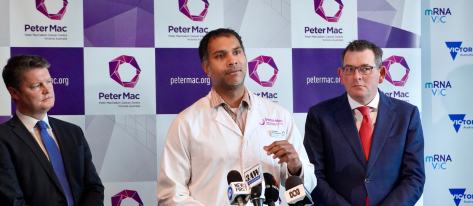
- Details
- Written by: David Walsh
- Category: News
- Hits: 1689
Peter Mac played host to Premier Daniel Andrews and the Hon Ben Carroll, Minister for Industry and Innovation, as they announced grants for researchers to develop mRNA treatments to target prostate, bowel and breast cancers today.
Peter Mac’s Dr Vihanda Wickramasinghe and Professor Mark Dawson both received $500,000 grants to further research looking to use ground breaking mRNA treatments in the treatment of cancerous tumours.
Peter Mac CEO, Professor Shelley Dolan said the potential for mRNA to treat cancer is huge.
“Our world-renowned researchers are building on decades of research excellence to harness the power of mRNA to treat cancer, with benefits for millions of cancer patients worldwide,” Professor Dolan said.
Premier Andrews and Minister Carroll toured the Peter Mac laboratory space with Dr Wickramasinghe to understand more about his team's work.
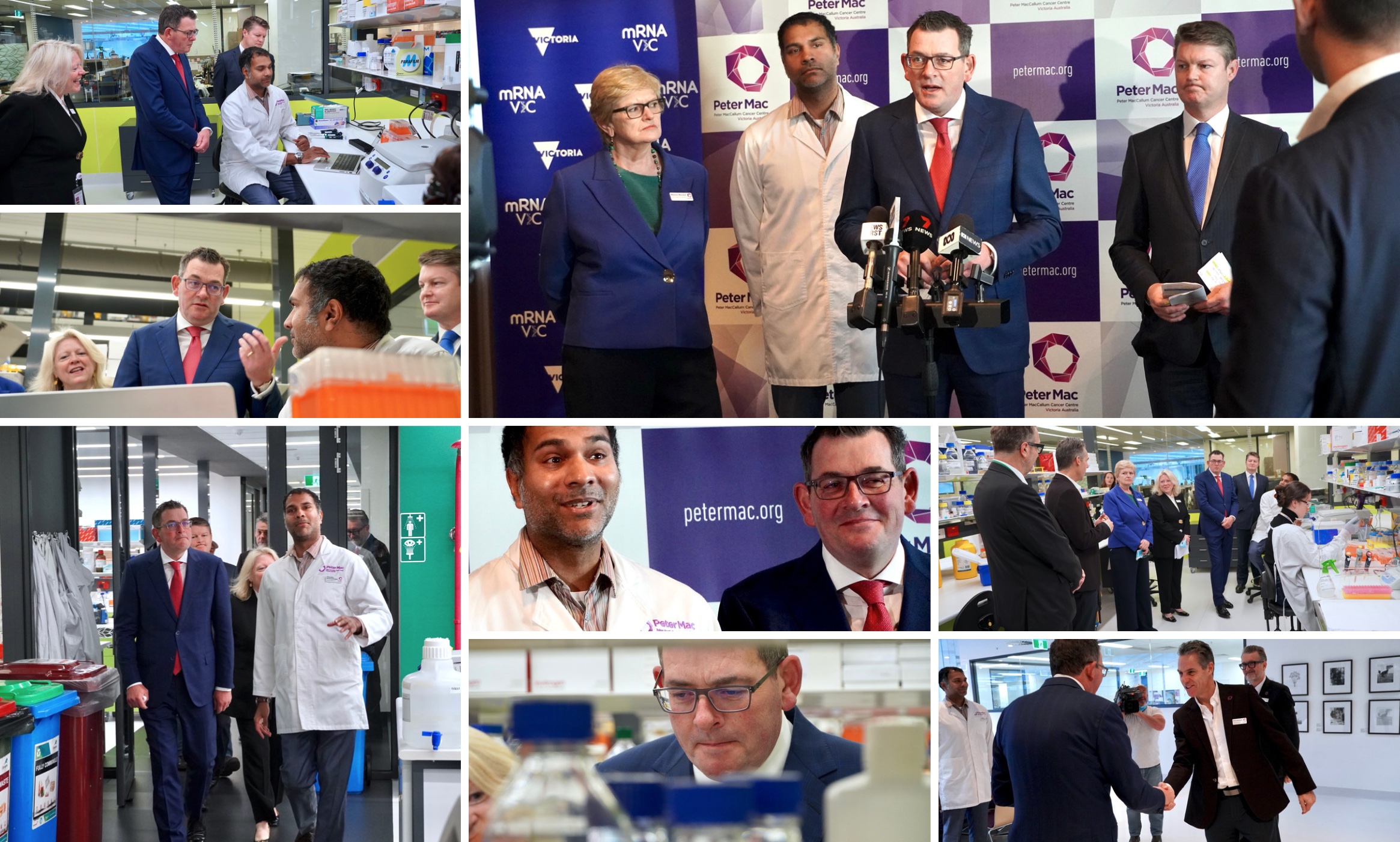
“Victoria is already a world leader in medical research and mRNA technology – researchers are now one step closer to leading mRNA therapies for treatments for cancer that will change the lives of cancer patients and their families,” Premier Daniel Andrews said.
“Researchers at the Peter MacCallum Cancer Centre are building our mRNA industry to not only save lives, but also to create secure jobs for workers across the state,” Minister Carroll said.
Dr Wickramasinghe’s research is aiming to use mRNA to develop new therapeutics to selectively target cancerous tumours. In collaboration with experts from WEHI, his team hope to turn this discovery into new treatments for many hard-to-treat cancers like prostate, bowel and breast cancer.
“We have specific inhibitors that target specific cancer types,” Dr Wickramasinghe said.
"The idea is not to make just incremental advancements, we want to make massive advancements in the treatment of cancer."
Professor Dawson’s research will apply cutting edge mRNA biology methods that will help the immune system detect and attack cancer cells.
This project will develop pre-clinical evidence to enable their novel, first-in-class drug series that enhances ant-tumour immunity to be clinically translated into a first in human clinical trial.
Peter Mac is one of 16 local Victorian projects to receive a share of $2.7 million in grants from Round 2 of the mRNA Victoria Research Acceleration Fund. Other transformational projects supported include exploring mRNA-based treatments for tuberculosis, malaria, and Parkinson’s Disease.

- Details
- Written by: Danny Rose
- Category: News
- Hits: 588
A major study of how COVID-19 affected Australian cancer patients has shown its impact eased through the pandemic as the arrival of vaccines, a less severe variant and early intervention treatments saved lives.
Led by Infectious Diseases researchers at Peter MacCallum Cancer Centre, the study assessed 620 cancer patients across 15 Australian hospitals who caught COVID-19 from March 2020 to April 2022.
Cancer patients are vulnerable to COVID-19 due to a weakened immune system being a common result of cancer or cancer treatment, reducing their ability to fight off and recover from any infection.
All-cause mortality in these patients in the 100 days after COVID-19 infection was 10.6% – well below the mortality seen internationally of up to 38% for patients with blood cancers, one of the highest risk groups.
“We found overall that one in ten Australian cancer patients who caught COVID-19 died within 100 days of the infection, either as a result of COVID-19 or an unrelated cause,” says Dr Victoria Hall, Infectious Diseases physician and PhD candidate at Peter Mac and University of Melbourne.
“While this is a significant loss of human life, it is well short of what was seen elsewhere for this vulnerable patient group.
“Contributing factors include that most Australian cancer patients caught COVID-19 in early 2022 during the Omicron wave and after COVID-19 vaccines had become widely available, and there were also measures in place to rapidly detect infections and provide protective antiviral treatments to this group.”
Dr Hall said like what was seen in the general population, the Omicron variant appeared to be less severe in patients with cancer than previous strains of COVID-19.
The average age of Australian cancer patients who caught COVID-19 was 63.5 years, with slightly more men (50.6%) and overall, 73.4% were vaccinated against COVID-19.
The rate of deaths declined over the course of the pandemic, with all-cause mortality in 2020 at 25.6% but in 2022 it was 8.1% in cancer patients.
“Just as we saw deaths in this vulnerable group decline over time there were also consistent drops in the rate of patients needing a hospital stay of more than 24 hours, those who required oxygen or an ICU stay, and those who required mechanical ventilation,” Dr Hall said.
Find the paper - titled “COVID-19 infection among patients with cancer in Australia from 2020-2022: a national multicentre cohort study” - online as just published in the journal Lancet Regional Health Western Pacific.
Contacts
For more info or to arrange an interview contact the Peter Mac Communications team on 0417 123 048.
About Peter Mac
Peter MacCallum Cancer Centre is a world-leading cancer research, education and treatment centre and Australia’s only public health service solely dedicated to caring for people affected by cancer.
